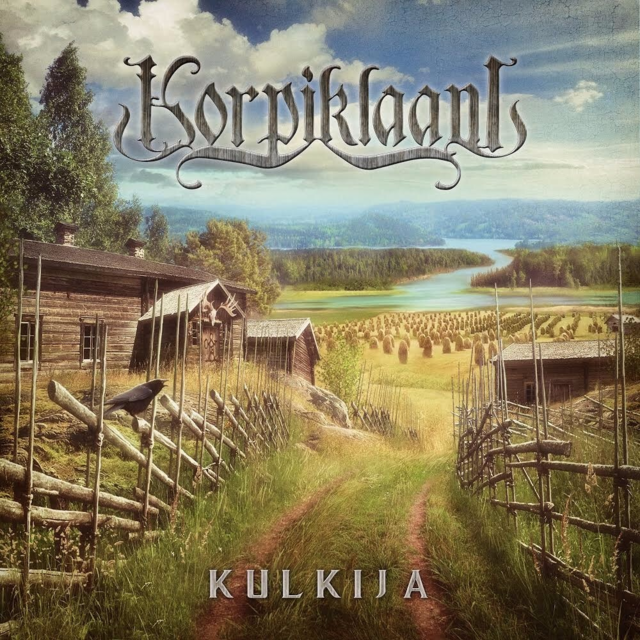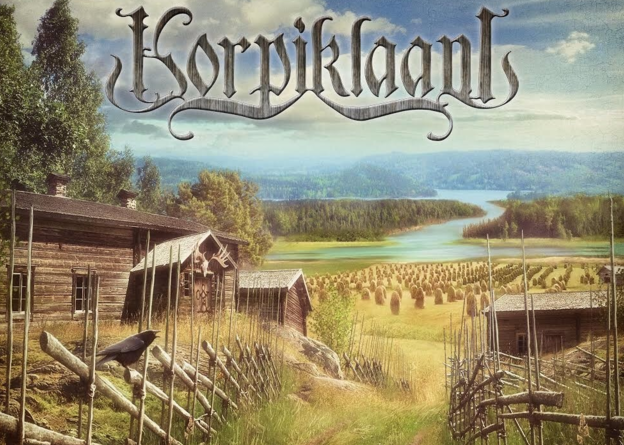ALBUM REVIEW: Kulkija – Korpiklaani
Finnish folksters KORPIKLAANI are fifteen years into an illustrious career of excellent folk metal. Kulkija marks their tenth and longest album, and showcases the band in as reflective a mood as they’ve ever been.
Kulkija translates to “the wanderer”, but he is a character to whom we will return later. Most listeners, casual or otherwise, will know KORPIKLAANI for their drinking songs. In this, Kulkija does not disappoint. Juomamaa (Drinker’s Land), for example, is about a pleasant day’s drinking with friends. Perhaps there’s a round of sahti on the table, to be chased down with vodka. Whatever your poison, it’s an infectious song with a toe-tapping rhythm and some excellent musicianship on display. Fiddler Tuomas Rounakari and accordionist Sami Perttula play off each other over guitarist Cane’s driving riffs during the intro in such a relaxed and easy way you’d think all three had been members of the band since inception. Given that it is Perttula’s second album with the folksters, and Rounakari’s third, it’s more indicative of how well the two have settled in with the other musicians that they can all riff off each other so dexterously and make it sound so easy.
That chemistry is just as noticeable on the album’s primary ballad, Harmaja (The Grey). It takes just as much control and inter-musician familiarity to play slowly as it does to play quickly. The fact that the band can pull off one of the slowest songs of their career and make it feel natural and un-hurried is testament to how well the musicians have grown in their playing together. Lyrically, the ballad recounts the story of a blackbird with a broken wing which yearns to fly south, in turn evoking the mournful anxiety of a fading memory. Rounakari’s violin is the primary melody maker, buoyed by the accordion and mandolin, and it’s just as mournful a violin as a folk tune could want. Vocalist Jonne Järvelä’s voice is husky over the top of the carefully-paced music; one might imagine him singing this at a campfire at dusk. This atmosphere brings to the fore the unspoken theme of the album: feeling a wistful pensiveness wash over you in sync with the colours of the world around you. It’s what any true wanderer feels and, no matter which song on the album you’re listening to, there it is. It’s as true of Harmaja and Tuttu on tie (The Road is Familiar) as it is of the more joyful numbers like Juomamaa and Riemu (Joy).
After all, it is ‘the wanderer’ from whom the album takes its name. As a character, he features in six of the songs, though this is not a concept album. The wanderer is more of a framing device for the album as a whole. It starts with Neito, a song about the wanderer’s experience at large: married to the road, it carries him far away and off to his adventures. It ends with Tuttu on tie, again about the road, but this time bringing him home. All the wistful wanderlust and inner peace he feels along the way – as well as the strange creatures and interesting people he encounters – are here in one album. It’s a very human feeling, and indeed the stories the listener is treated to are as often about human endeavours as they are folk tales. For example, Henkselipoika (A Boy In Suspenders) is about the flutterings of young love, with the band acting almost as matchmakers at a barn dance in the amusing video released with the single.
Beyond the framing story, the most interesting thing about Kulkija is the generally slower feel to the music. There are fewer drinking songs and crowd-pleasing jigs a la Vodka, Sahti, or Tequila. That slower pace, that wistful atmosphere, and the greater emphasis on one character might feel like an aberration from the norm for KORPIKLAANI. But it would be fairer and more accurate to say that it represents an evolution for the band. They made their name with fun songs about booze, but that doesn’t mean there isn’t room to experiment.
That, and they are storytellers first, boozers second (though personal mileage on this may vary). Take Sillanrakentaja (Bridge Builder). It tells the story of a giant building a bridge over a lake, who is ridiculed by a housewife for his scruffy appearance. In retribution, he hurls one of the huge rocks he was using at the housewife, and where it lands marks the boundary between two villages. Verifying this legend is beyond the remit of this article, but more intriguing is the use of children’s vocals. The children of both Cane and Jonne contributed their fine singing voices, which make it seem as if the legend is a very localised one, told to children who enquire about the origins of the enormous rock even as they play around it. The slow, chugging riffs, reminiscent of latter-day BLACK SABBATH, sound like the giant himself plodding about while he builds his lake. It’s a story in song, and one told with experimental flourishes in the music that really bring it to life.
But this still leaves both casual and long-term listeners with questions. Who exactly is the wanderer? Where do these experimental flourishes come from? Why can’t we just have an album of drinking songs more like Karkelo or Ukon Wacka? Well, for one thing, KORPIKLAANI have grown beyond being the band that wrote Vodka. The line-up has changed significantly since then, and there are many stories to recount. The experimental flourishes reflect this: although the musicians here have now been together for two albums, a more fluid line-up can allow much more room for pushing at the boundaries of the music being composed. And the wanderer? Beyond simply being a story-telling device, the wanderer is whoever you want them to be.
Ultimately, Kulkija may frustrate those who have come seeking a toe-tapping banger about drinking heavily. If you can look beyond that, however, you’ll find an album full of stories, mythic and real, of humans and monsters alike. They may be wistful, they may be jolly, they may even involve drinking. But they are recounted by master storytellers, excellent musicians whose skill and passion is a joy to listen to.
Rating: 8/10

Kulkija is out now via Nuclear Blast Records.
Like KORPIKLAANI on Facebook.

